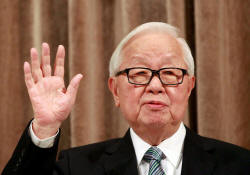TSMC's Chang, known as father of Taiwan's chip industry,
to retire
 Send a link to a friend
Send a link to a friend
 [October 02, 2017]
By Jess Macy Yu [October 02, 2017]
By Jess Macy Yu
TAIPEI (Reuters) - Taiwan Semiconductor
Manufacturing Co (TSMC) founder and chairman Morris Chang will retire in
June, after having built the Apple Inc supplier into the world's biggest
foundry chipmaker with a market value of about $185 billion.
Chang, who is 86 and is known as the father of Taiwan's chip industry,
will be succeeded as chairman by Mark Liu who has been co-CEO along with
C.C. Wei since 2013, TSMC announced on Monday. Wei will become the sole
CEO.
The change in leadership comes at a critical time as TSMC, which has
thrived on booming demand for chips used in smartphones, now seeks to
diversify its customer base and move into emerging industries such as
artificial intelligence and autonomous driving.
It must also deal with a growing threat from Samsung Electronics, the
world's top memory chipmaker, which plans to triple the market share of
its contract chip manufacturing business within the next five years by
aggressively adding clients.

The succession plan has been in the works for years. Liu and Wei have
held complementary posts since 2012 when they were chief operating
officers before assuming co-CEO roles in 2013. Previously, they were
senior vice presidents - Wei for business development and Liu for
operations.
Liu studied electrical engineering and computer science at the
University of California, Berkeley. Wei studied electrical engineering
in Yale University. Both Liu and Wei have doctorates.
Chang, citing personal and family reasons, said that upon his
retirement, he would not sit on the board of directors or participate in
management activities.
He founded TSMC in 1987 with paid-in capital of T$1.4 billion ($45
million) and pioneered contract chip manufacturing for chip design firms
which don't have their own factories. He has been its chairman since
then.
[to top of second column] |

Taiwan Semiconductor Manufacturing Co Ltd (TSMC) Chairman Morris
Chang gestures while answering a question during an investor
conference in Taipei, July 16, 2014. REUTERS/Pichi Chuang/File Photo

Chang spent 25 years at Texas Instruments and holds a doctorate from
Stanford. Born in China, he went to Taiwan in 1985 after being recruited
by the government to head a body promoting industrial and technological
development.
TSMC has since grown to command 56 percent of the $47 billion market
while revenue has climbed to around $30 billion in 2016.
The planned leadership succession will not change the company in a
fundamental way, analysts said.
"I think Liu and Wei will continue TSMC's current model for some years,"
said Mark Li, an analyst at Sanford C. Bernstein. "I do see the
increasing cost of newer generation technologies as an issue but for now
TSMC will still maintain the cadence of R&D development."
But if something new comes up, such as uses of new technology that
increases TSMC's cost, they'll need to change their plan accordingly, Li
said.
Prior to the announcement, shares of TSMC closed up 1.85 percent. They
have risen 22 percent so far this year, making it the most valuable firm
in the Thomson Reuters Global Semiconductor Index, ahead of stalwarts
such as Intel Corp and NVIDIA Corp.
(Reporting by Jess Macy Yu; Additional reporting by Miyoung Kim; Editing
by Edwina Gibbs and Muralikumar Anantharaman)
[© 2017 Thomson Reuters. All rights
reserved.] Copyright 2017 Reuters. All rights reserved. This material may not be published,
broadcast, rewritten or redistributed.
 |